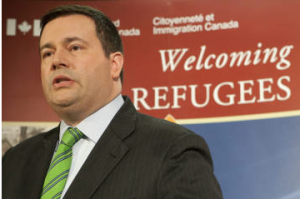
Canada’s immigration minister proposed sweeping changes to the country’s asylum legislation on Tuesday, aiming to help clear a multiyear backlog in processing refugee applications and stem a recent inrush of claimants.
The overhaul would address an asylum system considered one of the fairest and most generous in the world—but that is now clogged by cases after a 68% rise in applications since 2005. Jason Kenney, minister of citizenship, immigration and multiculturalism, blames this on a slow, convoluted approval system he says has been exploited by claimants who are after economic opportunities and benefits, not protection from persecution.
The changes would speed hearings, streamline appeals and accelerate deportations when applications are denied. They are “essential to fix serious problems in Canada’s asylum system,” Mr. Kenney said, adding that he hopes the amendments will pass in Parliament in time for implementation next year.
No opposition parties have said they’ll vote against the amendments yet, and one has signaled cautious support.
Critics warn the plan could erode Canada’s position as a haven by removing safeguards that give anyone a fair chance to show they need protection. Refugee-advocacy groups and opposition-party legislators are wary of a proposal to deny appeals to applicants who come from countries to which Canada deems they can be safely returned.
“To set up two classes of refugee claimants is not right,” said Olivia Chow, the lawmaker from the left-leaning New Democratic Party who handles immigration issues. “Every single individual should have equal rights.”
Under Canada’s current system, applicants apply under the standard United Nations definition of a refugee, meaning they fear some sort of persecution at home. In Canada, each is granted a full hearing by a judicial body, a process that has won praise from the United Nations’ refugee agency, said Peter Showler, a professor of refugee law at the University of Ottawa law school and former chair of the Immigration and Refugee Board of Canada, the government agency that reviews asylum applications.
In recent years, that ease of application combined with the lengthy review process has meant a greater caseload than the system can handle. Mr. Kenney says it has also encouraged more applications from people who don’t need protection but hope to figure out a way to stay during the years it takes to process their cases.
Canada had a backlog of 61,000 refugee applications at the end of December. On average, claimants must now wait 19 months for a first hearing; applicants who are denied can stay for as long as 10 years until they have exhausted all avenues of appeal and are deported, Mr. Kenney said. Nearly 60% of applications are eventually denied.
The proposed asylum-system overhaul will cost an estimated 540 million Canadian dollar (US$530 million); it would require initial hearings on applications within 60 days, conducted by civil servants rather than political appointees as is done now. It would also increase resources for security screenings, a step the U.S. has long requested, said Mr. Kenney.
Rejected applicants can appeal the decision unless they are from countries listed as “safe”—generally democracies with “robust” human-rights records, which don’t normally produce refugees, Mr. Kenney said. The removal of that appeals process will allow Canada to deport rejected applicants from these countries much faster than it does now, he said.
“It’s a tool that’s used not to restrict [applicants’] access to a hearing but to accelerate removal after they’re denied,” said Mr. Kenney.
Mr. Kenney noted that many European countries, including France, Germany and the U.K., already use such lists. Canada will craft its own list in consultation with the United Nations High Commissioner on Refugees, and will consider only countries that fit the qualifications, and are “major sources of unfounded asylum claims,” he said.
A case in point is Hungary, the source of 2,440 asylum applications to Canada last year, second only to Mexico. Only 267 cases from Hungary were closed in 2009. Of those, the vast majority–97%—withdrew their applications on their own. Of the cases actually heard, three people were admitted and five rejected.
Some asylum applicants subsequently said they were coached to file false claims in order to receive welfare and social benefits, Mr. Kenney said.
Refugee advocates warn it’s not easy to determine which countries are safe and which aren’t. Some governments may ignore violence against ethnic populations or be too corrupt to enforce laws that officially protect their citizenry. Others don’t offer adequate protection to women who are victims of domestic violence, or gays and lesbians who face persecution at home, said Janet Dench, executive director of the Canadian Council for Refugees.
Take our FREE Online Assessment Today!
Socialize with Abrams & Krochak
